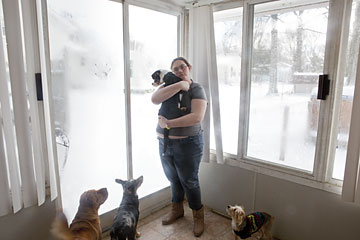
(4 of 6)
In Eric's case, the first step to solving the problem was to change his diet. Amador removed candy from the house and switched Eric's favorite fruit punch to water and low-fat milk. She restructured her grocery list to include more fruits and vegetables and healthy snacks like sunflower seeds. She even had a talk with Eric's friends since she knew they often stopped by a corner store on the way home from school for candy, chips and soda. "I told them, 'If you love my Eric, do not take him to the store and do not use your money to feed him,'" she says.
In the past, Eric, like most other kids, would see a doctor once a year. Now he and his mother visit the hospital to see a gastroenterologist for his fatty liver once a month, and that's likely to continue for the foreseeable future. Dr. Sanjiv Harpavat, a pediatric gastroenterologist at Texas Children's Hospital and one of the people managing Eric's case, plans to put him on a trial that's testing whether cystamine, a drug used to treat a rare amino-acid disorder, can improve the symptoms of fatty liver. If it can, the boy might be spared the even greater problem of cirrhosis--to say nothing of the liver transplant that could be required later if his condition doesn't change. So far, however, Eric is drinking more water and becoming more physically active, and Amador is hoping for the best. "We are doing everything so he can change his life and his future," she says.
The Meds Dilemma
How long Eric may need to be on the liver-protecting drug isn't clear, but for some children taking various medications, the answer could be as simple as it is terrible: forever. When Crystal Aguilar of Houston was diagnosed with diabetes at age 16, she sat in the car with her parents and cried. Having witnessed the bruises on the arms of her diabetic mother as a result of her daily insulin injections, she says, "I was terrified. I didn't want to spend the rest of my life like that."
At the time, Aguilar, who is Hispanic and concedes that her family was eating plenty of dense, high-calorie foods like tortillas and greasy meats, weighed 230 lb (104 kg). "I did not consider myself as big as I was," she says. Within a week of her diagnosis, she was giving herself two insulin injections every day. Although pills like metformin can help the body's insulin break down glucose more efficiently, for patients like Aguilar, whose blood sugars are so high, injectable insulin is often the quickest way to bring those levels back to within the normal range.
"When we start children on medications, we are entering a new phase of the disease," says Harpavat. "That's the point where we have to put our idealism that the kids will change their behaviors voluntarily aside. We almost have to save their bodies from themselves."
Beyond drugs, there aren't a whole lot of choices. The best the AAP can recommend as an alternative to the prescription pad are the familiar lifestyle strategies: a healthier diet and more exercise. A recent advisory panel added cognitive behavioral therapy to the mix to help kids learn self-management skills. As a guideline, it makes sense. In practice? Not so much. "The parents get excited for a day or two and listen to everything you say, and within days, it's done, and they revert back to their old habits," says Harpavat.
